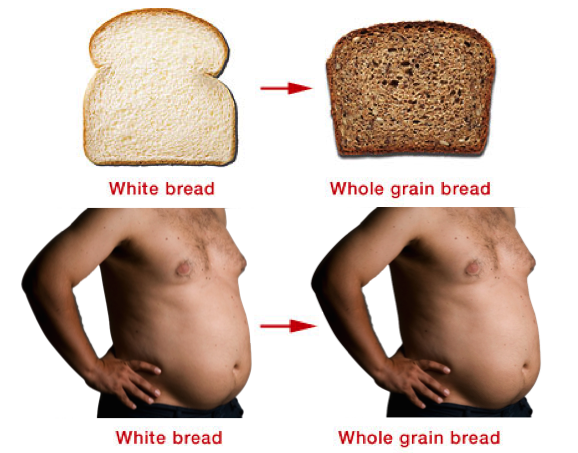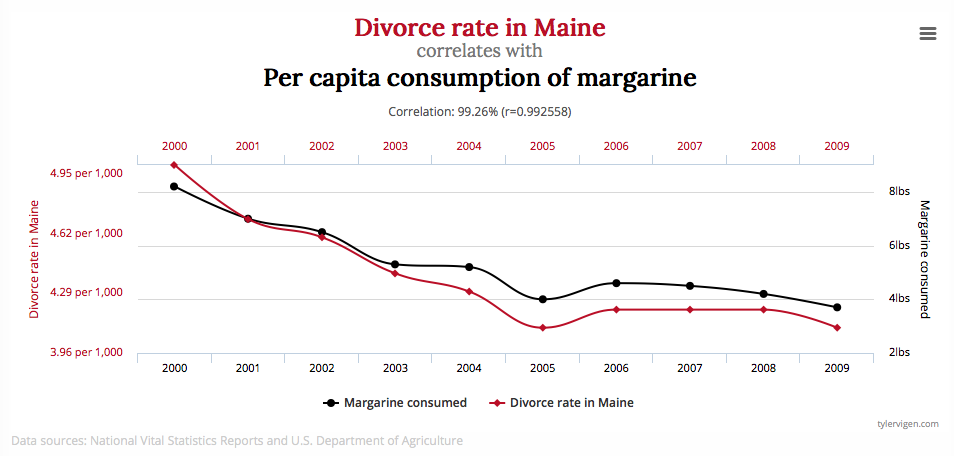“Six of one, half dozen of the other” is the perfect way to describe the difference between whole grains and refined grains – as you’re essentially deciding between a wire-brush with nutrients you can’t access, and a fiber-less insulin intravenous.
Although, “Same shit, different day” also seems appropriate, based on what the damaging proteins in these indigestible grass-seeds can do to your gut (1, 2, 3).

There’s really no upside to eating grains, and plenty of downside. Which is why it was surprising to come across this recent meta-analysis in the journal Circulation, that demonstrated an:
“inverse associations of Whole Grain intake with total and cause-specific mortality, and findings were particularly strong and robust for CVD mortality.”
And this one in the British Medical Journal (also from last month) that found a:
“reduced risk of coronary heart disease, cardiovascular disease, and total cancer, and mortality from all causes, respiratory diseases, infectious diseases, diabetes, and all non-cardiovascular, non-cancer causes.
Normally, we wouldn’t look twice at these claims, considering everything we now know about grains, and considering previous evidence has made it quite clear that:
- The blood sugar response from whole grains compared to refined grains is nearly equivalent.
- Swapping refined grains for whole grains has no significant reductions in body fat or the other risk factors for the metabolic syndrome.

But because these are review studies (a higher quality of evidence than a single finding), and because there doesn’t appear to be any funding from Kellogg’s or Mediterranean Diet pumping researchers, they’re worth taking a look at. Especially if any of you reading this happened to catch the misleading headlines in the US, UK, and Canada.
Whole grains can help you live longer, Harvard study finds –Chicago Tribune
Three slices of wholemeal bread a day slashes risk of dying from heart disease by 25% -Daily Mail
Eating whole grains for better health? –Global News
Not surprisingly, the evidence doesn’t justify the commentary; and similar to our Red Meat Research discussions in the past (1, 2), the study doesn’t really ‘prove’ anything.

The first consideration is somewhat trivial, but it’s worth mentioning in order to fully appreciate the foot we’re starting off on. Basically, this is a review of ‘observations.’ Meaning, it’s a conglomerate of studies that followed and tested specific populations over a certain period of time; with scientists trying to find associations between specific behaviors and specific outcomes. In this case, eating whole grains and mortality.
So, before we even get into any potential problems, the first question to ask yourself is whether or not an analysis of non-causal observations means anything to you?
Keeping in mind, that many things fluctuate together, but aren’t necessarily related.
The next thing to look at is how strong this association is, because if it’s anything close to VERY significant, it’s probably worth exploring further (with randomized controlled studies). This time, keeping in mind that we want to look at the ‘absolute’ risk, not the ‘relative’ risk (like the media loves to).
To put it simply, a relative risk of 25% is like saying 5 people out of 100,000 got heart attacks instead of 4 people out of 100,000. In absolute terms, this is 0.001%! Which hardly justifies a second look, and hardly sounds like a headline.
“Three slices of wholemeal bread a day slashes risk of dying from heart disease by 0.001%!!!”
But the real problem with this evidence, is that it comes with the same food-questionnaire flaws and healthy-user bias we see with the Plant-Based Propaganda. Since, those actively selecting ‘whole’ grains are trying to eat and live healthier in general, and those that aren’t are grouped into this massive pool of fast-food eating, couch-surfing sloths.
A point that was noted as a limitation in the BMJ study:
“People with a high intake of whole grains might have different lifestyles, diets, or socioeconomic status than those with a low intake, thus confounding by other lifestyle factors is a potential source of bias.”
And it essentially boils down to whether you think Muesli eating Mitch from Minnesota being healthier than Pop-Tart Crushing Kyle from Kentucky means you should start eating whole grains?
Knowing that the REAL evidence suggests Grain-Free Greg from Gainesville would take the cake.

Even though he’s smart enough not to eat it….whole or refined.
Stay Lean!
Coach Mike
RELATED ARTICLES:
The Problem With Red Meat Research
Zonulin - Connecting Wheat & Leaky Gut?
From Chronic Inflammation to Chronic Disease

